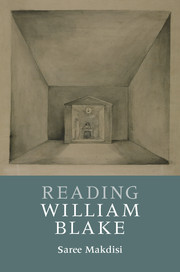6 - Time
Published online by Cambridge University Press: 05 May 2015
Summary
Ah Sun-flower! weary of time,
Who countest the steps of the Sun:
Seeking after that sweet golden clime
Where the travellers journey is done.
Where the Youth pined away with desire,
And the pale Virgin shrouded in snow:
Arise from their graves and aspire,
Where my Sun-flower wishes to go.
The eight deceptively simple lines of “Ah! Sun-Flower” in Songs of Experience engage one of the themes to which Blake turned most often in the illuminated books, namely, the question of time. Different notions of time are registered everywhere in Blake's work, in all kinds of ways, whether thematically, as in this case, or more subtly in terms of the relationship of rhyme or meter to temporal patterns, or in terms of a set of philosophical or theological reflections on alternative modes of temporality, or, finally, in terms of the temporal structure expressed by the open nature of Blake's texts themselves.
Several different forms of time are marked out in the sunflower poem, and we might think of it as a meditation on the relationship and interaction of these different temporal modes. We have first of all the notion of linear time: the time of a journey to which the poem refers, which follows an arc or a line from beginning through the middle to end. We have the notion of diurnal time whose progress is repeatedly marked by the sunflower, or in other words the time of cyclical repetition according to which each day repeats the pattern of the day before it. And we have the notion of life-time, which combines both other notions, depending on whether we think of a life-time as marking in effect a straight line from birth to the finality of death (assuming death is final of course) or as marking a cyclical pattern of repetition and rebirth.
- Type
- Chapter
- Information
- Reading William Blake , pp. 95 - 111Publisher: Cambridge University PressPrint publication year: 2015

